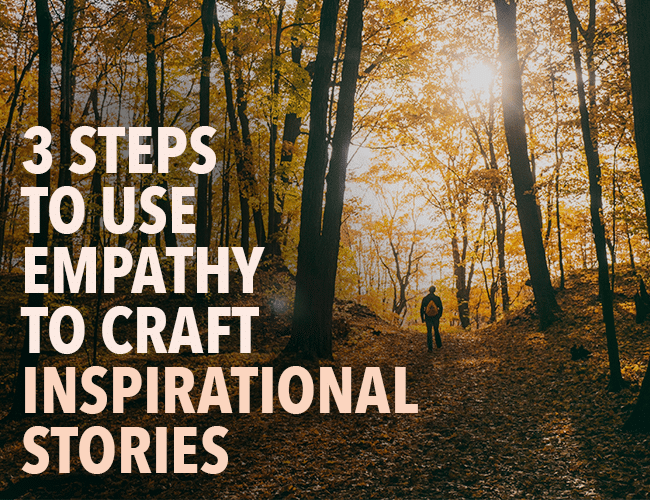People love to be inspired. It’s what draws us to stories of underdogs, great achievers, and even, to an extent, celebrities. We love to see how regular people just like us can succeed against all odds.

Storytellers often try to cash in on this audience appreciation for underdogs, but we can easily miss the foundational element of an underdog story: empathy. The reason the audience becomes entranced by the story of an underdog is not because underdogs are fundamentally attractive; we are entranced because we empathize with them.
3 Steps to Cultivate Empathy and Craft Inspirational Stories
Empathy is one of the most powerful tools available to a storyteller. Whether you are writing a novel, nonfiction, a screenplay, or even an ad campaign, empathy can draw your audience into the story and, by the end, inspire them as well. This is the heart and soul of a powerful story.
I will provide you with three integral pieces of story structure that you can use to create empathy in your story: creating a relatable protagonist, developing empathetic conflict, and delivering a shred of hope in an otherwise hopeless situation.
1. Create a relatable protagonist
Anyone, or indeed anything, can be a protagonist. That's the beauty of modern storytelling. If Pixar has taught us anything, it's that you can take a child's toy, a clown fish, a basic emotion, a tow truck, an umbrella, or even the monster living beneath your child's bed and make it a relatable protagonist.
Relatability is the key attribute of your protagonist. It doesn't matter if he/she is human, inanimate, selfish, kind, or scary; if you can make a protagonist relatable, you invite your audience into a deeper connection with your story.
One of the most effective ways to build relatability is to give your protagonist a dream or ambition—something that will lead to perfect happiness. Everyone has a dream, and your audience can relate to having a dream or ambition. Depending on the maturity level of your audience you could keep it simple—being with the one you love—or make it more complex—bringing the joy of music to an orphanage of starving children in Africa.
2. Develop empathetic conflict
Making your protagonist relatable is the first step to building empathy. The second step is giving your protagonist empathetic conflict.
This is different than simply providing conflict. Anyone can create conflict. Left to their own devices, humans will eventually create conflict. Conflict on its own is neither inspirational nor empathetic.
The best way to create empathetic conflict is to return to the protagonist's dream and ambition. Since this is what your audience will find most relatable, it is also the most efficient way to tug at their heartstrings. Bring the dream/ambition into reach; give your protagonist—and your audience—hope that it can be attained. And then snatch it away.
We can all relate to the lost dream. After all, who among us hasn't had their own dream stolen by the harsh reality of life? Your audience can feel the pain of a lost dream because they have experienced it. You have created empathy.
3. Deliver a shred of hope
You could leave your story here. Some of the greatest stories of all time end in this fashion: Romeo and Juliet, The Fault in Our Stars, and Titanic, just to name a few. Such tales can have inspirational elements, but is that enough?
Stories are like magic: you can make something disappear and your audience will be shocked and surprised, but make it reappear and they will be astounded and inspired.
The final step to inspiration through empathy is to bring back hope when everything seems hopeless. It's the classic underdog story: the underdog has a dream, the dream appears within reach, an unforeseen outside force pushes the dream out of reach, the underdog gives it one last try, the dream is achieved.
Whatever you do, don't make it easy for your protagonist. Your audience can't relate to an easy life; they won't feel empathy for someone who has it easy. The more difficult the journey, the more empathetic your audience will be, and the more inspiring your story will become.
Empathy Leaves Lasting Impressions
Developing an empathetic connection between your audience and your protagonist will go a long way not only in the development of your story, but also in leaving a lasting impression. By creating a relatable protagonist, developing empathetic conflict, and delivering a shred of hope in a hopeless situation, you can turn your manuscript into an inspirational masterpiece.
What stories have inspired you and led you to empathize with the characters? Let us know in the comments.
PRACTICE
Take fifteen minutes to write an inspirational story. In 100 words or less, write a short story that utilizes all three aspects of empathy development: relatable protagonist, empathetic conflict, and a shred of hope. Sound tough to do in 100 words? It is. Don’t let that stop you.
When you're done, share your story in the comments. Don't forget to leave feedback for your fellow writers!







Thanks for the post, Kyle. I enjoyed exploring your websites, as well.
Here is my practice … went with a metaphor. Kept it to 100 exactly (resisted the temptation to leave it at 101). Thanks for the guidance and the challenge.
The hard edge of the balance beam taunts the soft flesh of her feet. Much more solid, though, than the tight rope on which she had traversed the chasm. A lightness is quickly burdened by weights on her ankles and wrists. Undaunted in her envisioned goal, but not in her heart, she moves forward, progressing through the routine she had seen effortlessly performed by others. They were no better than her, she knew. The hues of the audience softened into a watercolor, lifting her through the movements, each flow of her limbs melding into the next. A medal at last.
Susan,
Thank you for your feedback! This is hard to do in 100 words, isn’t it? I find flash fiction to be such a good way to practice clarity and word choice. I liked your use of language here. Word choice like “taunts” and “undaunted” give your audience that spark of hope without having to use a lot of words to do so. Keep it up!
I stepped to the plate, cleared my cleats and took my stance sweat filling my eye. Too late for a time out now. Through the sting of saltwater I watched helplessly as the ball left the pitcher’s hand and rocketed toward me, floating in a slow curve outwardly from my line of sight then reversed course and drifted once again into its aimed path. Time gave way to instinct as muscles became rock and wood rotated through heavy air. Silence. The sound of wood on leather awakened the crowd as the stitched round took flight. My appearance in the Majors.
I love the relatability in this story. Who wouldn’t be terrified in their first at-bat in the Majors?
I enjoyed this, Ron! I’ll point out a few phrases that were particularly vivid for me:
“Too late for a time out now”
“…I watched helplessly as the ball left the pitcher’s hand”
“Time gave way to instinct as muscles became rock, and wood rotated through heavy air” [editing note: need that comma after rock (and a couple other places in the piece)]
“Silence. The sound of wood on leather awakened the crowd as the stitched round took flight”
Much of this can be applied to other situations. Nice job.
Thanks for your kind words, Susan. Funny how you can miss simple punctuation when you wrap yourself in the story.
Hi Ron,
You showed me that something as simple as up to bat can create empathy in only 100 words. I love the ball can be part of a reference to surviving difficulties in life.
We at Writologycom offer high quality writing services. Among our numerous professional freelancers you can find the one that best fits your needs. You can rest relaxed – we’ve got it all handled, no matter the outline or the knowledge field of the requested text. Come and see for yourself at http://writology.com/
I stare at the blank page with my pen in hand. Words betray me. I only know to reach my dreams of fame and fortune my prose must be perfect. I rack my brain over the approaching deadline with doom and gloom. My story remains unwritten, useless, and utterly disgusting. Without a plot, I will fail this assignment then I might quit writing. I fear it’s all been published before.
I write a story of focus pocus. Someone has already written hocus pocus, but not in the exact same tone as me. Success I completed a story.
Awesome, Diane. Certainly fitting : )
I really enjoyed the concepts you included!
Thank you Susan. It is my first attempt at Flash Fiction. Now I see what a learning tool it is.
Your’s was beautiful.
Thank you.
Fun to be challenged, right? Great practice for sifting through synonyms and scanning your brain for lush phrases. : )
Best advice ever -> “Whatever you do, don’t make it easy for your protagonist.”
I think the hardest part of building empathy for your protagonist is making sure that your hero isn’t too strong. When you put him in that proverbial tree and start throwing rocks at him, make sure the rocks keep getting larger and more difficult to dodge.
I’ve been disappointed in more than one story in which the protagonist had it too easy. If the main character is an undefeated champion, then he (or she) must face defeat for the first time in his/her life/career.
This is why I was never a fan of Hulk Hogan in the 1980s. The invincible good guy was boring to me even as a kid.
The examples which come to my mind are from movies. In “Enter the Dragon,” Bruce Lee’s character is unbeatable. Even when he battles the bad guy at the end, he only ends up with a few scratches. It seems more like a minor inconvenience than an epic fight.
In “Predator,” however, Arnold Schwarzenegger gets his ass handed to him. He comes so close to defeat one is tempted to call it a draw.
Nope. A mere hundred words doesn’t do my story justice, and I won’t sell my story short. Or my readers.
Empathy, a great quality to have as a writer and as a human being. Thank you.
I was recently reading https://askopinion.com/inspiring-story-of-nick-vujicic-the-man-born-with-no-arms-and-legs and seen perfect blend of all the aspects, loved the pattern .